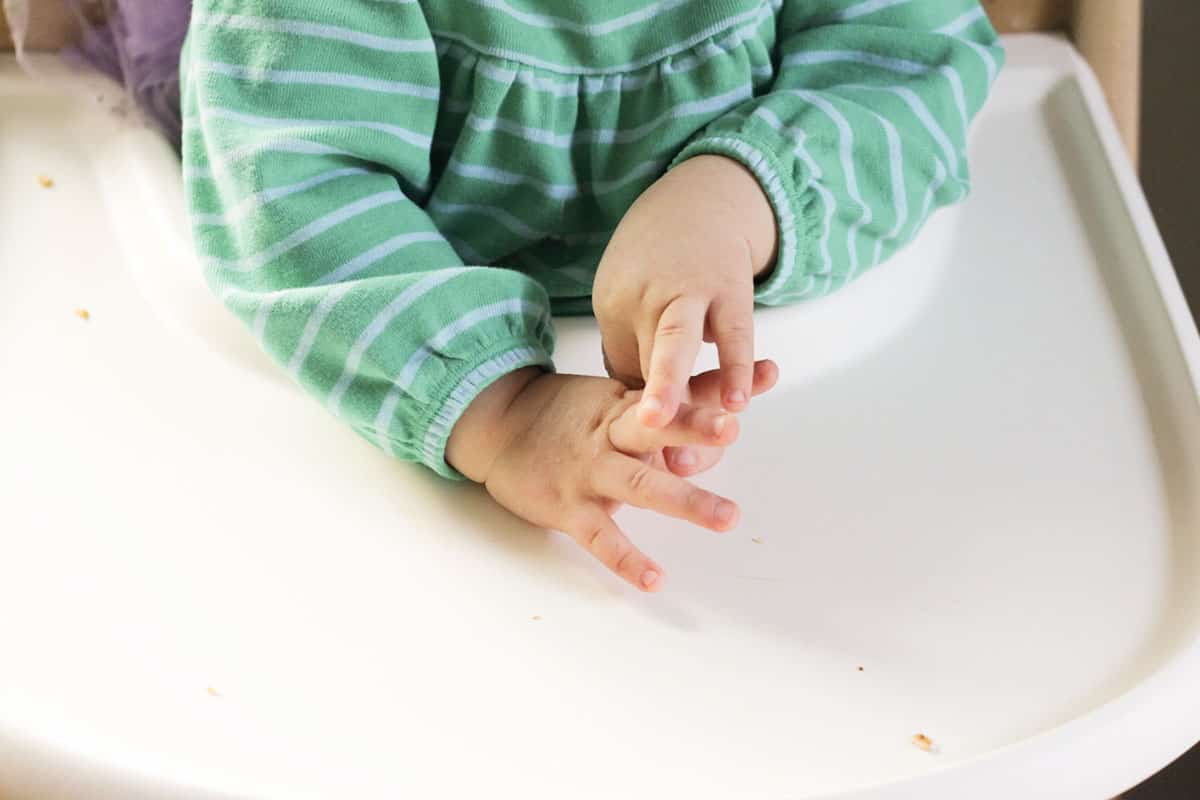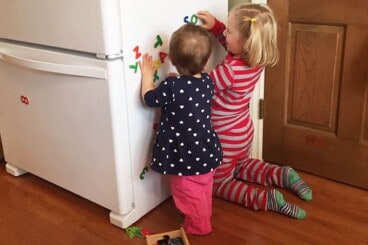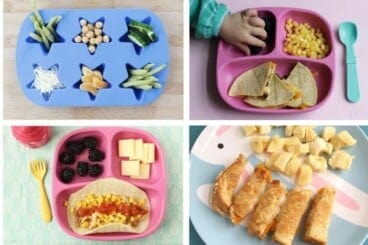If you have a toddler throwing food, you know firsthand how frustrating it can be. Here’s why it might be happening and a few easy things you can try to decrease food throwing at the table.

Toddler Throwing Food
Sometimes toddlers throw food to get a reaction as they learn that they’re independent from us, or to see what happens when a food falls. Other times it’s because they don’t like the food or they’re full. And sometimes, well, who knows!
These tips on how to minimize toddler food throwing are meant to give you some ideas for how to handle this toddler behavior in your house and to move through the phase without dreading mealtimes. Here’s not spending too many minutes picking up food off of the floor!
Table of Contents
Your toddler won’t eat? Help is here!
Sign up for our email updates to get tips and ideas sent to your inbox.
1. Serve a very small amount of food at a time.
A typical toddler serving is ¼ of the size of an adult serving. It’s entirely possible your toddler is eating enough, even though it may seem like they’re not eating much to you. Keep their size in mind and give them only a few pieces of any one thing at a time. This will help to avoid having too much on their tray—which can be tempting to play with and overwhelming to picky eaters.
It may be possible to try this for a period of time to reset the behavior and then go back to a larger portion.
2. Use an all-done bowl.
Many parents use a “discard” or “all-done” bowl as a deliberate place for kids to put food they don’t want. This can direct their impulse to throw the food with a specific spot to put it.
3. Involve them in Mealtimes before sitting down.
Ahead of the meal, you can offer a choice between two foods to make your toddler feel happier about what you’re serving. A choice between two veggies or fruits can go a long way to making a child feel like they have a say in what they get to eat if they seem to be throwing food because they don’t like it.
You can also try teaching younger toddlers the sign for “all done,” which might give them something else more productive to do with their hands—and the independence to communicate more effectively.
4. Let it be ok if your child doesn’t like a food.
My youngest will throw food he doesn’t want to eat. It’s not because he’s acting out, it’s simply that he doesn’t want the food on his tray because he has no intention of eating it. Instead of treating this like bad behavior, I offer to take the food from him and he usually happily hands it all to me, one piece at a time.
5. Sit with your toddler during meals.
Giving focused attention before throwing food may help stave off the behavior—because often the habit is an effective, if problematic, way to get their point across. Sit with your child during a meal, talk to them (even if they don’t yet talk back much!), and pay attention to what they like and how they eat. Maybe she needs more help with the spoon or something cut up more so it’s easier to eat.
By focusing on your toddler during a meal, you may be able to see issues start sooner than you have been—and you can end it immediately by helping them to get cleaned up and onto the next thing.
6. Have together time when you walk in the door.
It can help to have 10-15 minutes of dedicated together time as soon as you walk in the door at the end of the day—if doable with your schedule. So instead of heading straight into the kitchen to start dinner and expecting your little one to entertain themselves, read a book or play a game or dance together. (I know this can be a lot to ask when you need to get dinner started so everyone can eat and get to bed, so here are a few make-ahead dinner options that can make weeknight cooking a little easier!)
I also like to turn on music at the end of the day and dance my way through making dinner with the kids underfoot. It helps my attitude as much as theirs!
7. Consider your reaction.
With many things involved in raising toddlers, the less you can turn something into a power struggle, the better. It’s entirely possible that the food throwing is happening precisely because they always get a reaction—and toddlers like attention! Keep calm and try to keep your own emotions in check. You can hold their hand down, look them in the eye, and say something like “food is for eating, not for throwing.”
Be firm and consistent with your response, respond immediately, and hopefully they will soon realize they will no longer get the reaction they expect from their behavior.
And remember that acting playful and silly attitude can totally change the vibe in the room. This can help everyone to move on more quickly rather than escalating the situation.
8. End the meal.
This can be difficult since so often we want the kids to eat more at meals, but often a toddler plays with his food, throws his food, or throws a fit because he’s not hungry enough to eat it. If your toddler starts any of this, give him the choice to eat or play. If he picks play, remove him from the table, put his food in the fridge, and try the meal again in 30-60 minutes if the schedule allows. It’s possible he needs more time to work up an appetite. (I do acknowledge that this is difficult when you need to be somewhere!)
9. Remember this is not forever.
This is a phase that will, at some point, pass! A toddler throwing food is not necessarily a sign of a huge problem and can often be handled with minor tweaks to your routine and response.
Related Posts
This post was first published June 2018.























Hahaha literally toddlers are bananas. Last week, I asked my son if he wanted a rocket popsicle and he said yes of course. I took it out of the wrapper and handed it to him, he then screamed that “it wasn’t the right one” and threw it on the carpet. Unfortunately, it stained and I had to call for professional but we needed a good cleaning anyways. So I guess it worked out? But I need to figure out how to stop him from throwing food on the ground! I hope your tips work!
You have tremendous ideas. Thank you for all the work you do creating recipes and giving out great ideas.
Our son used to bang bang bang the utensils in a restaurant ( then let them fly) .He was playing ????argghh.
Our daughter sat quietly with her bread stick lol
His first and last supper in a restaurant.
Hubby and I found a young sitter who came over for a couple of hours ( once a month)- they had their fav food – pizza and we went out – sometimes for a picnic with our fav food – then back home to put them to bed.
Pheww – a well deserved break
Once a month feed and put them to bed and have your own date night meal once they are asleep – carve it into your schedule or it won’t happen.
Hello, I am about at the end of my ropes! I am a single working parent of a 2 1/2-year-old girl who is a very picky eater. One day she’ll love something and the next day she is throwing a tantrum and will not eat. Tonight, I pretty much lost it. All she wanted was watermelon and would not touch the rest of her food. Ending in her flipping over her plate and throwing it on the floor. I picked up the food and removed her from the table. I just don’t know what to do. Sorry, this is more of a cry for help than a comment! Any advice, Moms?
I guess I’d ask what was the problem with her eating her watermelon? Is there room to believe that she wasn’t hungry for more than that at that particular meal?
It is very important to deal with this behavior when kids are young. My parents didn’t amd I’m stuck with an adult sibling who throws food on the floor and it will remain there for months for years (moldy at first then dry and hard) if someone else doesn’t clean it for them. Every time I deal with a middle aged sister tamtrum, I curse my parents for not parenting.
That is unfortunate (and also, I think, a pretty rare outcome since growing up she should have encountered a lot of other situations in which that would have been socially unacceptable, such as school or in a workplace or with friends)